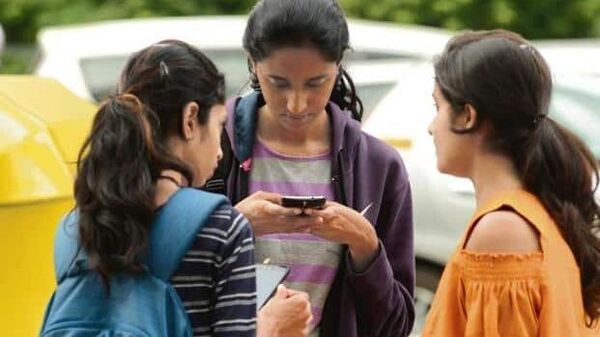Whilst synthetic intelligence (AI) chatbots corresponding to ChatGPT are being launched on cell gadgets, the United Nations Instructional, Scientific and Cultural Organisation (UNESCO), is urging faculties all over the world to ban smartphones. UNESCO says these gadgets can – and do – distract college students, decrease their social interactions, and adversely have an effect on studying. The transfer is prone to please academics and oldsters however not digital-native college students who had been born right into a world with the web and smartphones.
Mere proximity to a cell gadget was discovered to distract college students and have a damaging influence on studying in 14 international locations, UNESCO stated in a 435-page report launched on Wednesday. It stated that whereas large-scale worldwide evaluation information, corresponding to that offered by the Programme for Worldwide Scholar Evaluation (PISA), counsel a damaging hyperlink between extreme use of data and communications know-how (ICT) and scholar efficiency, lower than one in 4 faculties have banned smartphones.
UNESCO acknowledges that distance-learning instruments deployed through the Web, tv and even radio had been essential throughout the pandemic, and may assist in another way abled kids who might wrestle in a conventional, in-person setting. However, it provides, these instruments have many downsides too, which on the entire warrant a ban.
To start with, smartphones can enhance the digital divide in faculties. UNESCO argues that whereas know-how provides an “training lifeline for hundreds of thousands”, it excludes many extra. The report underscores {that a} third of pupils don’t have efficient entry to distance studying since solely 40% of major faculties worldwide presently have Web entry. The speedy shift to on-line studying throughout the pandemic, for example, ignored an estimated 500 million college students worldwide, principally from marginalised, rural communities.
A lot of faculties in low- and middle-income international locations, particularly major faculties, don’t even have electrical energy. UNESCO, which insists that the proper to training is more and more synonymous with the proper to significant connectivity, says it could price $1 billion a day to keep up connectivity for training in poor international locations.
Second, the report argues that even when connectivity was common, digital know-how might not add actual worth when it comes to efficient studying, even because the dangers of extreme display time have gotten more and more evident. Highlighting the excellence between fundamental cellphones that aren’t internet-enabled, function telephones and smartphones, the report argues that intensive use of smartphones and computer systems can disrupt studying within the classroom and at house.
The decline in studying is principally linked to elevated distraction and time spent on non-academic actions throughout studying hours. Incoming notifications and even the mere proximity of a cell gadget generally is a distraction. The usage of smartphones in lecture rooms causes college students to interact in non-school-related actions, which impacts recall and comprehension. The report cited a examine that discovered that it may well take college students as much as 20 minutes to refocus on what they had been studying after participating in a non-academic exercise.
In keeping with Manos Antoninis, the director of the World Training Monitoring (GEM) Report, individuals “do not essentially want very refined abilities” to navigate the digital world. “Those that have the perfect studying abilities are these least prone to be duped by a phishing e-mail, for example,” he provides.
Third, regardless of the need to make training a world frequent good, just one in seven international locations legally ensures the privateness of instructional information even because the position of business and personal pursuits in training continues to develop. Antoninis advised UN Information that solely 16% of nations have legal guidelines that assure information privateness within the classroom.
Fourth, the report factors out that “good, neutral proof on the influence of training know-how is in brief provide”, with training know-how merchandise altering each 36 months, on common, and most proof coming from the richest international locations such because the US and the UK. It additionally states that “exaggerated claims about know-how go hand in hand with exaggerated estimates of its international market measurement”.
The UNESCO report acknowledges that “some training know-how can enhance some forms of studying in some contexts”. It cites the examples of the Nationwide Tutorial Digital Library of Ethiopia, the Nationwide Digital Library of India, and the Academics Portal in Bangladesh, which has over 600,000 customers. The Indira Gandhi Nationwide Open College, the world’s largest college with over 3.3 million college students, serves historically marginalised communities and makes use of a multi-instructional system that features print and audiovisual supplies, radio, tv, net conferencing and prompt messaging. In China, too, high-quality lesson recordings delivered to 100 million rural college students improved studying outcomes by 32% and diminished urban-rural incomes gaps by 38%.
However the report additionally insists that we must always concentrate on studying outcomes, not digital inputs. In Peru, for example, when over one million laptops had been distributed with out being included into pedagogy, studying didn’t enhance. Within the US, too, evaluation of over two million college students discovered that studying gaps widened when instruction was solely distant. The report notes that even on the earth’s richest international locations, solely about 10% of 15-year-old college students use digital gadgets for greater than an hour every week in arithmetic and science.
Affect of generative AI
The UNESCO report acknowledges that the evolution of know-how is placing a “pressure on training methods to adapt” with digital literacy and important pondering turning into more and more necessary, notably with the expansion of generative AI. This new know-how has the power to study the construction of virtually any data – be it textual content, picture or video – and generate new content material based mostly on ‘prompts’. Many faculties have banned using ChatGPT as college students had been discovered to be utilizing it to do their homework. Nonetheless, the UNESCO report argues that extra proof is required to grasp whether or not these AI instruments can change how college students study, “past the superficial stage of acquiring solutions and correcting errors”.
In keeping with the report, if written assignments not point out mastery of sure abilities, faculties must develop new evaluation strategies. Likewise, if AI tutoring replaces at the least some instructing duties, instructor preparation and practices might want to shift accordingly.
To make sure, a UNESCO international survey in 2022 confirmed that 11 of 51 governments had developed and carried out AI curricula. France already has a method to develop AI analysis capability, together with via a expertise attraction and help programme, whereas India’s Nationwide Technique for AI contains training as one in all 5 focus areas. Singapore’s Nationwide AI Technique and the EdTech Plan (2020-30) highlights using AI for personalising instructing. However the unfold of generative AI additionally brings its share of dangers.
On this context, the UNESCO report makes a robust case for instructor coaching, declaring that solely 50% of nations presently have requirements for growing educators’ data and communication know-how (ICT) abilities, whereas even fewer have teacher-training programmes overlaying cybersecurity.
The report concludes that “the perfect pursuits of pupils ought to systematically take priority over some other consideration”, notably business issues. It says know-how ought to all the time be seen as a method and by no means an finish, and insists that “know-how must be launched into training on the premise of proof displaying that it could be acceptable, equitable, scalable and sustainable”.





